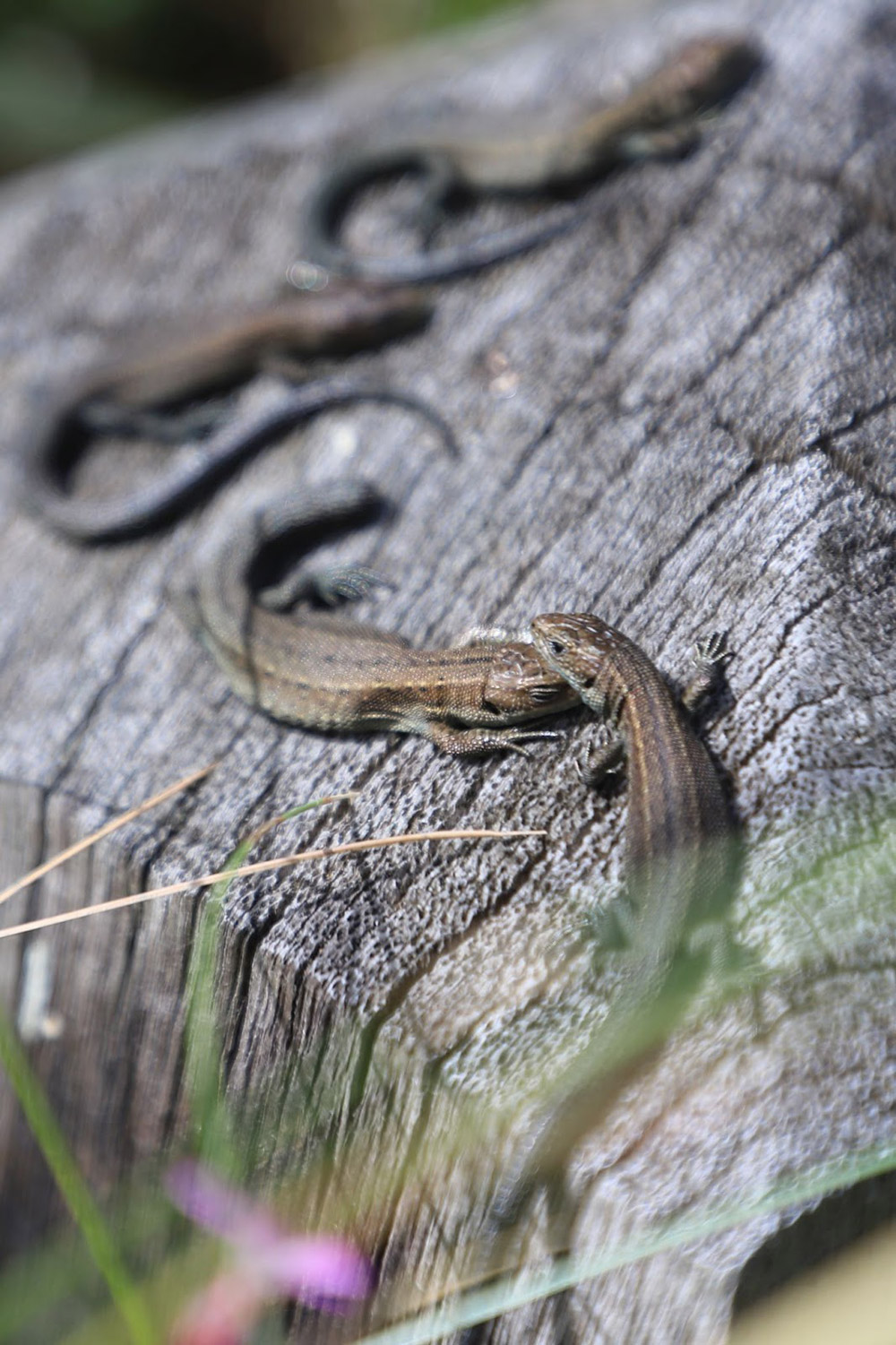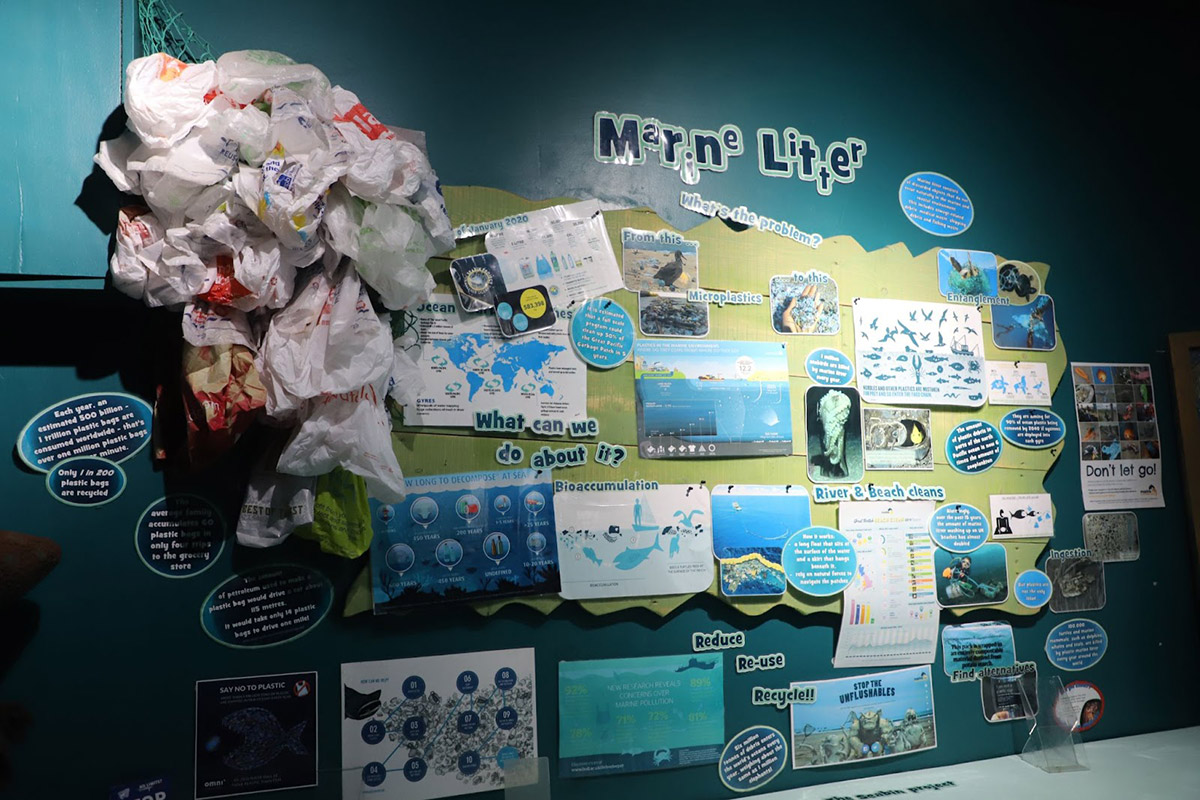

As some of you will know I have just been on a holiday with my family. I am pleased to say it was a very enjoyable low carbon holiday. What made it a low carbon holiday I hear you ask. We did not travel too far just to South Anglesea and from there we were able to enjoy a number of local attractions. These included exploring the wonderful beaches and sand dunes on the South West coast with views across to Snowdonia.
Humans were not the only sunbathers as you can see in the photograph.
We also went to the local Sea Zoo largely powered by solar panels and doing its bit for conservation by breeding lobsters and returning them to the sea when big enough not to be predated. They also had a very telling display of marine litter and what we can do about it.

Other attractions included a day at GreenWood Family Park with 30 rides and activities using green energy produced by the sun, water and humans. GreenWood was listed on The Guardian’s ‘Green Travel List’ as one of the 7 top green attractions in the world. To examine the green credentials of GreenWood Family Park see Going Green – GreenWood Family Park web page.
Good News
- Publicly owned energy company launched in Wales
- Millions prepared to pay more for green goods – as Rishi Sunak backtracks on net-zero policies, poll suggests
- Public worry about climate change and energy security in the cost-of-living crisis
- Urban trees in spotlight on Woodland Trust’s annual award shortlist
- ‘This way of farming is really sexy’: the rise of regenerative agriculture
- Bacteria that ‘eat’ methane could slow global heating, study finds | Greenhouse gas emissions | The Guardian
- Dead flies could be used to make biodegradable plastic, scientists say
- Sacred sites have a biodiversity advantage that could help world conservation
- Turning to faiths to save the planet. How religions shape environmental movement in Indonesia
- Lawsuits are key tool in delivering climate justice, says UN body
- UK homes install ‘record number’ of solar panels and heat pumps | Renewable energy | The Guardian
- Guest post: How the Inflation Reduction Act narrows the gap to US climate goals – Carbon Brief
- Reefs made from trees could help restore biodiversity, study finds
On the 22nd July I went with Gordon McKay to Buxton to hear Isobela Tree give a talk about rewilding her Knepp Estate. Her talk was aimed at selling her new book on the subject but if you want a concise summary of the project without having to buy the book I suggest you read this article. From debt to diversity: A journey of rewilding, carbon capture and hope
I have included the paragraph below by Courtney White on ‘Green Cement’ as its production would save a significant amount of carbon dioxide emissions.
Green Cement – In July, climate-friendly cement became the first to win third-party certification for use in construction projects. This is important because nearly 8% of total global carbon dioxide emissions are generated by cement manufacturing, making it worse for the climate than flying. That’s due to a combination of baking limestone to make cement, which releases CO2, the high energy requirements of the kilns, and the sheer scale of cement/concrete use worldwide. The certified cement is part of a push to develop low-carbon and carbon-negative alternatives, collectively called green cement. Examples include algae-grown limestone; the use of fly ash, a type of volcanic ash, instead of limestone; reviving the ancient Roman way of making concrete, which requires less curing; self-healing concrete; and living concrete which utilizes bacteria and sunlight to create a binder that can be poured into any shape. Numerous research projects are ongoing, including University of Tokyo scientists working on a process that recycles old concrete products using lower kiln temperatures. Another option is to replace concrete altogether with bio-based building materials. See Green Cement Nexus and Carbon Architecture Nexus for more information!
Good News Bad News
- Poorer countries must be compensated for climate damage. But how exactly do we crunch the numbers?
- Is climate change really a reason not to have children? Here’s four reasons why it’s not that simple
- Q&A: How China is using nuclear power to reduce its carbon emissions
- Do heat pumps work in the UK’s climate? An expert answers your low-carbon heating questions
- Rising temperatures mean more air conditioning which means more electricity is needed – rooftop solar is a perfect fit
- ‘Gigantic’ power of meat industry blocking green alternatives, study finds
- An updated roadmap to Net Zero Emissions by 2050 – World Energy Outlook 2022 – Analysis – IEA
- Anger is most powerful emotion by far for spurring climate action, study finds
Not So Good News
- Healthy diet in UK at risk from Mediterranean droughts, experts say
- Threat from climate change to some of India’s sacred pilgrimage sites is reshaping religious beliefs
- Around 100,000 people evacuated due to floods in Pakistan | The Straits Times
- Tropical Storm Hilary unleashes flash floods in California | Reuters
- Ocean heat record broken, with grim implications for the planet – BBC News
- ‘Catastrophic breeding failure’ of emperor penguin colonies for first time due to record low Antarctic sea ice
- One in four living with extreme water stress – these are the countries worst affected
- How Canada’s wildfires are warming the stratosphere – BBC Future
- Eastern Canada wildfires: Climate change doubled likelihood of ‘extreme fire weather’ – Carbon Brief
- Global oil demand hits record and may rise further
- Rising methane could be a sign that Earth’s climate is part-way through a ‘termination-level transition’
- Climate change is making debt more expensive – new study
- Plants find it harder to absorb carbon dioxide amid global warming | New Scientist
- Some tropical rainforest leaves are becoming so hot they are unable to photosynthesise, study finds
- Volcanoes and wildfires offset 20% of global heating over eight years | Climate crisis | The Guardian
- Microplastics discovered in the body tissues of whales, dolphins and seals – sparking concerns for human health too
- What role did the climate crisis play in Storm Hilary – and could there be more like it?
- Sunak’s £755mn oil tax giveaway
- G20 poured more than $1tn into fossil fuel subsidies despite Cop26 pledges – report
- Fossil fuels being subsidised at rate of $13m a minute, says IMF
Other Media News
What makes a healthy river? Is the title of this week’s ‘Inside Science’ on BBC Sounds. I can recommend this broadcast if you are just interested in or quite knowledgeable about the conditions of our rivers. River health has captured the public imagination, particularly as overspills from sewers have been getting more attention in the media. But the condition of a river is so much more complicated than what flows into it from our water treatment systems. Agriculture, roads, how we use our drains, what we buy and even the medicines and drugs we take can all have an impact on our rivers and the plants and animals that call them home.
Another radio broadcast that I can recommend if you are at all interested in systems thinking is this weeks Great Lives’ where Economist Kate Raworth chooses the Environmental Scientist Donella ‘Dana’ Meadows. Following the publication of ‘Limits to Growth’ 50 years ago Dana dedicated her life to living by the principles of sustainability (a word coined by the Limits to Growth team) and to teaching the principles of ‘systems’ thinking, which she believed could help people understand and live more harmoniously with the planet.
Have we underestimated climate change? Prof Jim Skea, the Scotsman from Imperial College the newly-elected chair of the Intergovernmental Panel on Climate Change (IPCC), joins the host of the World Service program ‘The Climate Question’ to discuss how worried we should be, and the challenges ahead as he takes up the most important role in global climate science.
I thought you might like the following email that has been circulating:
The bicycle is the slow death of the economy. A cyclist is a disaster for the country’s economy: he does not buy cars and does not borrow money to buy. He does not pay for insurance policies. He does not buy fuel, does not pay for the necessary maintenance and repairs. He does not use paid parking. He does not cause serious accidents. He does not require multi-lane highways. He does not get fat. Healthy people are neither needed nor useful for the economy. They don’t buy medicine. They do not go to hospitals or doctors. Nothing is added to the country’s GDP (gross domestic product). On the contrary, every new McDonald’s restaurant creates at least 30 jobs: 10 cardiologists, 10 dentists, 10 dietary experts and nutritionists, and obviously, people who work at the restaurant itself.” Choose carefully: cyclist or McDonald’s? It is worth considering. P.S. Walking is even worse. Pedestrians don’t even buy bicycles.
I can highly recommend this excellent very recent 25 min TED Talk by Al Gore. Despite the fact that he points out why we are not making headway with regard to reducing CO2 emissions, he is still optimistic and gives his view on how we can solve the climate crisis. What the Fossil Fuel Industry Doesn’t Want You To Know | Al Gore | TED
For a very different persons view see A True Paradise: WHERE WE ARE HEADING – Kevin Anderson, In this recent short 16 min film Prof Kevin Anderson warns that continuing on our current path could result in a 3-4°C temperature rise by the end of the century, a catastrophic outcome to be avoided at all costs. He cautions against believing the political rhetoric about progress in the fight against climate change and calls on us to push for bold policy changes to avoid a climate disaster. He tells us we have the choice!
If after watching this film you think we need a greater force to help us in this endeavour to control climate change you could consider going to the Environmental Church service 10.00 hrs on Sunday 27th August at the United Reformed Church Marple Bridge.
Last but by no means least the Greater Manchester Green Summit 2023 is on Mon, 2 Oct 2023 08:30 – 18:30 at The Lowry Theatre, The Quays, Salford. Click on the above link to register free. I went with Gordon McKay and Greg Pike last year and it was great. I highly recommend it.

